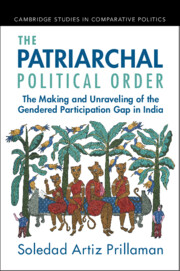 The Patriarchal Political Order
The Patriarchal Political Order Book contents
- The Patriarchal Political Order
- Cambridge Studies in Comparative Politics
- The Patriarchal Political Order
- Copyright page
- Dedication
- Contents
- Figures
- Tables
- Acknowledgments
- Part I The Puzzle of Women’s Political Participation
- Part II The Patriarchal Political Order
- Part III The Unraveling
- Part IV Consequences of Inclusion
- 9 Women’s Mobilization across India and Its Portents
- 10 Conclusion
- Appendices
- References
- Index
- Other Books in the Series (continued from page iii)
9 - Women’s Mobilization across India and Its Portents
from Part IV - Consequences of Inclusion
Published online by Cambridge University Press: 30 November 2023
- The Patriarchal Political Order
- Cambridge Studies in Comparative Politics
- The Patriarchal Political Order
- Copyright page
- Dedication
- Contents
- Figures
- Tables
- Acknowledgments
- Part I The Puzzle of Women’s Political Participation
- Part II The Patriarchal Political Order
- Part III The Unraveling
- Part IV Consequences of Inclusion
- 9 Women’s Mobilization across India and Its Portents
- 10 Conclusion
- Appendices
- References
- Index
- Other Books in the Series (continued from page iii)
Summary
Chapter 9 reveals that the circular patterns of norm renegotiation manifest at the national level in India’s broader women’s movement. It describes the history of this movement and then use ACLED data on all women-led protest events in India from 2016 to 2021 to illustrate the breadth of women’s collective mobilization and the range of demands raised. Women most often come together to protest more explicitly gendered issues, such as gender-based violence. However, many women-led protests focus on other demands, including improved government accountability and service delivery. The nature of women’s demand-making suggests possibilities for both gender equality and improved governance with their political inclusion. Finally, it documents broader patterns of resistance to women’s collective action at the national scale, documenting a range of explicit instances of violent backlash and summarizing the rise of the men’s rights movement in India. This provides further evidence of male coercion and suggests conditions under which women’s collective action can succeed.
- Type
- Chapter
- Information
- The Patriarchal Political OrderThe Making and Unraveling of the Gendered Participation Gap in India, pp. 249 - 269Publisher: Cambridge University PressPrint publication year: 2023
